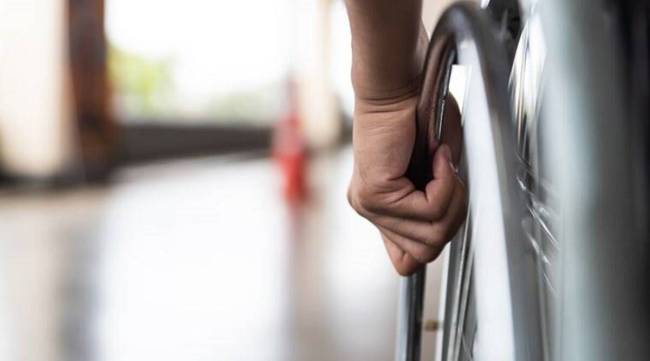Opinion Disability pride month: Disabled persons remain invisible in policy imagination
We can take pride in the fact that there has been a concerted push in ensuring greater accessibility for the disabled across domains. However, we need to pursue institutional solutions, usher in systemic reforms
 Disability Pride Month initially started as an occasion in the US to mark the signing of the Americans with Disabilities Act, 1990. (Representational image)
Disability Pride Month initially started as an occasion in the US to mark the signing of the Americans with Disabilities Act, 1990. (Representational image) Disability Pride Month is celebrated in July every year to embrace the identities of all persons with disabilities and reaffirm their rights and visibility, which, more often than not, get shrouded in our ableist structures. Disability Pride Month initially started as an occasion in the US to mark the signing of the Americans with Disabilities Act, 1990. However, over the past 33 years, these celebrations have transcended jurisdictional boundaries and Pride Month is now celebrated across the world.
In India, as we enter Disability Pride Month, it is only befitting that we set for ourselves bold and ambitious commitments to persons with disabilities as a nation and take incremental steps to bring about the change we wish to author. At the same time, we would be remiss if we did not look back and introspect on where we were and how far we have come.
In his address on “The Narrative of Justice”, Chief Justice of India D Y Chandrachud emphatically stated that “India’s narrative is the narrative of plurality and diversity which is the essence of freedom which we visualise for the future. To deny narrative is to deny identity”.
The impediments which plagued India’s disability law jurisprudence in the past decade did exactly this. The policies and approaches of government departments and private institutions were implemented without regard to reasonable accommodations. A direct causal link of such policies and approaches was that persons with disabilities remained shut out from a whole range of activities of daily life. Concurrently, the lack of swift, effective grievance redressal mechanisms and the presence of rampant red tape had a cascading effect in denying hundreds of persons with disabilities “their narratives” across the country.
These issues only got compounded with the onset of the pandemic wherein the majority of our institutions were forced to transcend physical boundaries and adapt to technology. While this transformation benefitted most able-bodied persons, it, unfortunately, furthered the tribulations of persons with disabilities. This was because most institutions, whether government or private, had merely resorted to automating their old ways of working. They had essentially transposed their old inaccessible physical infrastructures into a virtual environment.
Today, digital inclusion has become indispensable to anyone who wishes to forge even a remote sense of productivity in their lives. Yet, millions of individuals with disabilities are still shackled by digital barriers which deny them full and meaningful participation in the world. While the Rights of Persons with Disabilities Act, 2016, lays down legal obligations in this regard, its implementation still remains inadequate.
This glaring discrepancy highlighted the urgent need for targeted and strategic interventions. At Mission Accessibility, we attempted to address this by constructively engaging with the developers of platforms that were inaccessible to disabled users.
The path-breaking judgment of the Supreme Court in Vikash Kumar v UPSC and the work of the Supreme Court’s eCommittee are evidence of the difference that an inclusive mindset, coupled with swift and well-thought-out interventions, can make. A key forum in which we pursued change was legal. For instance, pursuant to our efforts in the Pathaan litigation in which one of the authors of this article (Rahul Bajaj) was a counsel praying for directions to make OTT content accessible for persons with disabilities, the CBFC has brought out an invitation for the expression of interest of accessibility professionals who will be working on making a digital film and OTT content accessible to persons with disabilities.
Similarly, in our capacity-building workshops for web developers of government websites at the central level as well as in Goa, participants were keen to acquire the knowledge and skills needed to create accessible digital experiences, though workshops only mark the starting point of the journey to achieve this goal. Likewise, the office of the CCPD took a major step in the right direction when it sent notices to more than 70 digitally inaccessible platforms and directed them to make such platforms accessible within six months. One hopes that service providers will take this obligation seriously and involve persons with disabilities in evaluating whether their platform is disabled-friendly. Significantly, the CCPD, for the first time in its order against PayTM, also directed a particular service provider to conduct an accessibility audit.
And yet, important as these issues are, we are conscious that they do not address the more fundamental, everyday challenges that the disabled face. We have therefore launched Project RPwD Generation, through which we intend to pursue strategic interventions, and litigation if necessary, to ensure more dignity for the disabled in accessing spaces, pursuing housing, education and employment and effectively exercising their rights when they are violated. Parallely, even as we pursue these systemic reforms, we are strengthening our grievance redressal work to provide every aggrieved disabled person high quality and swift access to justice.
We can take pride in the fact that there has been a concerted push in ensuring greater accessibility for the disabled across domains. However, we need to pursue institutional solutions, usher in systemic reforms and develop clear procedures to obviate the need for case-by-case and ad hoc interventions.
Bajaj is co-founder, Mission Accessibility, Senior Associate Fellow at the Vidhi Centre for Legal Policy and Attorney at Ira Law. Goyal is a Judicial Law Clerk at the Supreme Court of India and the sensitisation and capacity building lead of Mission Accessibility. Views are personal






